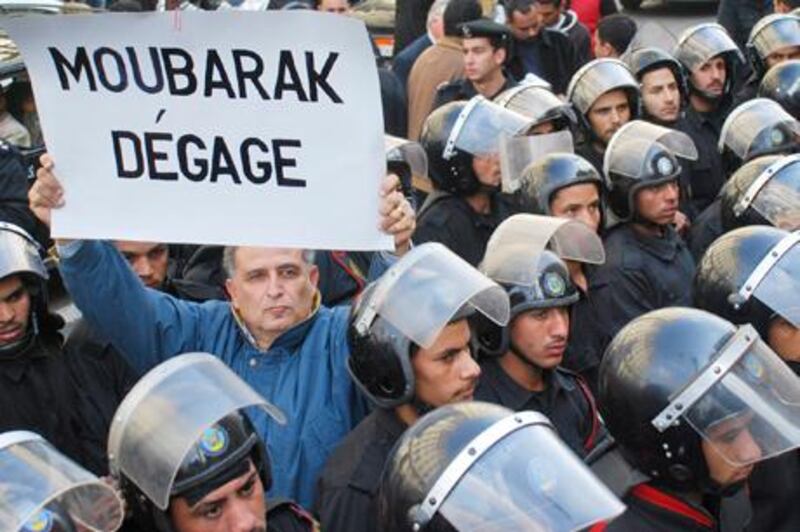CAIRO // Thousands of anti-government protesters massed at several locations in the Egyptian capital today, chanting against President Hosni Mubarak and calling for an end to poverty, in the first Tunisian-inspired protest in the country.
It was the biggest demonstration Egypt had seen in years and police showed unusual restraint in what appeared to be a concerted government effort not to provoke a Tunisia-like mass revolt.
The demonstrators sang the national anthem and carried banners denouncing Mr Mubarak and saying the Egyptian elections were fraudulent. The organisers and opposition supporters, drawing on the popular uprising in Tunisia, dubbed the planned rallies, expected mainly in Cairo and Alexandria, as "the day of revolution against torture, poverty, corruption and unemployment."
The rally call spread on Facebook and Twitter, with 90,000 saying they will attend. The centre of Cairo came to a standstill, with a massive security presence.
Amnesty International expressed worries over protesters' safety, urging authorities to "refrain from excessive and disproportionate force."
Outside the Supreme Court in central Cairo, black-clad riot police with batons linked arms to surround the protesters but did not clash or scuffle with them. The police, otherwise known for cracking down heavily and beating demonstrators at anti-government rallies, allowed a wave of protesters to break through a cordon to join the larger crowd marching toward downtown.
In Monhandeseen neighborhood, thousands marched with banners reading, "Long Live a Free Tunisia," while police stood on the crowd's periphery.
"We want to see change just like in Tunisia," said Lamia Rayan, 24, one of the protesters, as others chanted: "Down with Mubarak."
"Security forces are being neutral because we know we have a just cause," said 43-year old lawyer Tareq el-Shabasi. "I came here today willing to die, I have nothing to fear."
Abdel-Rahim Mustafa, an official with the movement called National Society for Change, said: "Change is coming, no doubt."
In Alexandria, police deployment was heavy and only 30 demonstrators showed up, waving Egyptian flags and calling for the regime's end. In Mahdiya village near the border with Israel, about 500 protested while police were told not to leave their stations.
Earlier today, the interior minister, Habib el Adly said "decisive measures" will be imposed in the face of chaos on what is otherwise known as "Police Day". a holiday honouring the orce. Government offices, businesses and schools were closed for the day.
Police arrested 15 members of the opposition Muslim Brotherhood in a Cairo neighbourhood, including a number of women. Brotherhood leaders had said they would not officially join the demonstrations but would not discourage members from taking to the streets.
The rallies came against a backdrop of growing anger in Egypt over wide poverty and unemployment, as well as questions about Mr Mubarak's possible successor in presidential elections later this year.
The first ramifications of the Tunisia uprising surfaced last week in Egypt when several people set themselves on fire or attempted to do so outside parliament and the prime minister's office. Their actions sought to copy a young Tunisian vegetable seller whose self-immolation helped spark the protests that forced Tunisia's authoritarian president to flee the country.
Nearly half of Egypt's 80 million people live under or just above the poverty line set by the United Nations at $2 a day. Poor-quality education, health care and high unemployment have left large numbers of Egyptians deprived of basic needs.
The government has played down self-immolation attempts, with the prime minister, Ahmed Nazif, telling reporters on Monday that those who committed the act were driven by "personal issues."
The call for protests was first initiated by "The Martyr" Facebook page, set up in the name of a young Egyptian man, Khaled Said, whose family and witnesses say was beaten to death by a pair of policemen in Alexandria last year. His case has become a rallying point for the opposition. Two policemen are currently on trial in connection with his death.





